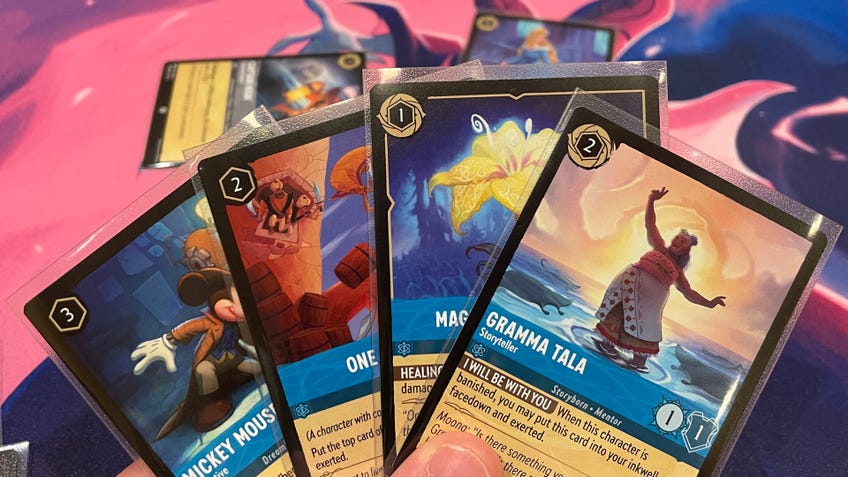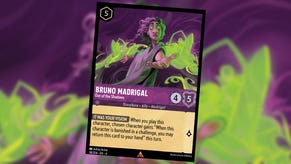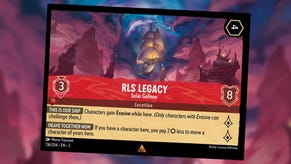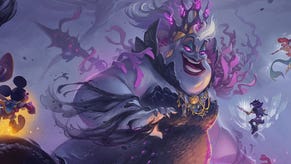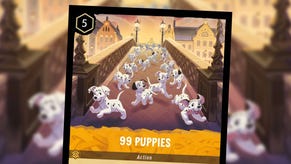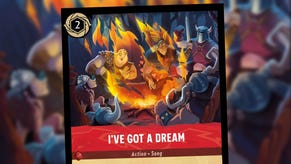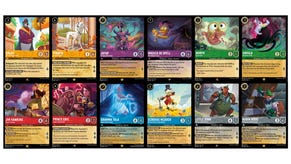Disney Lorcana lays an impressive, enchanting foundation for trading card games’ biggest shift in 25 years
A glimmer of brilliance.
Yu-Gi-Oh marks its 25th anniversary next year, Magic: The Gathering has just turned 30 and Pokémon celebrated its own quarter-century birthday just a couple of years ago. For three decades - or thereabouts - the trading card game scene has been locked down by what many consider to be an unbreakable trinity of games.
Many have tried to crack the tight hold held by the combination of MTG’s gameplay innovation, Yu-Gi-Oh!’s intense deck combos and Pokémon’s nostalgia-fuelled phenomenon, but none have truly muscled in and permanently evolved the state of the TCG scene. Based on my time with it so far, that could finally change with Disney Lorcana.
While other TCGs have found success, they’ve typically been on a far more modest scale. Recently, licensed card games - particularly those based on anime, like the One Piece Card Game and Dragon Ball Super Card Game - have been blowing up among dedicated fans of their respective franchises, but they still remain relatively niche among mainstream players.
On the other end of things, original games such as Flesh and Blood have earned respect among hardcore trading card game enthusiasts looking for an alternative to Magic: The Gathering, but don’t necessarily have the familiar characters and welcoming gameplay simplicity needed to bring in brand new players to the world of TCGs.
Backed by both that nostalgic appeal and what so far looks to be rich potential for proper gameplay depth, Lorcana manages to find a deft balance between being a light Disney title that casual players can get into though its playful, gorgeously-rendered takes on characters, songs and moments from the movies, and succesfully laying what feels like a solid enough foundation to grow an enjoyable game beyond its licensed ties. The hotly-anticipated TCG has already seen staggering demand during its pre-release at last week’s Gen Con, ahead of a wider launch in local game stores next week.
There’s a good reason for that excitement, aside from Disney fans keen to collect shiny cards. (Though that’s definitely part of it.) While comparisons to Magic: The Gathering are easy - there are a number of keywords with specific in-game effects, cards battle using two key values for their attack strength and health, and you can gradually play bigger cards as you build up your stock of in-game resource - Lorcana doesn’t just whack a set of Mickey Mouse ears on the veteran TCG.
Lorcana manages to find a deft balance between being a light Disney title that casual players can get into and succesfully laying a solid enough foundation to grow an enjoyable game beyond its licensed ties.
For one, there’s Lorcana use of ink as a resource used to play and activate cards - as well as serving as a fun part of the game’s multiversal lore that allows players’ Illumineers to conjure a Disneyworld’s worth of characters out of ink. (The turn you must wait to use a freshly-played character while they ‘dry’ is also a much cuter image than Magic’s ‘summoning sickness’.)
Being able to add a facedown card from your hand to your inkwell immediately overcomes the common MTG and Pokémon bugbear of finding yourself with no land or energy cards - any Lorcana card with the ink marker around its cost can be turned into ink - and sparks a delicious dilemma about which cards to sacrifice to the inkwell in order to play others. (I couldn’t stop thinking of the distinctly un-Disney image of Tigger being melted into a pot of steaming ink, Roger Rabbit-style.)
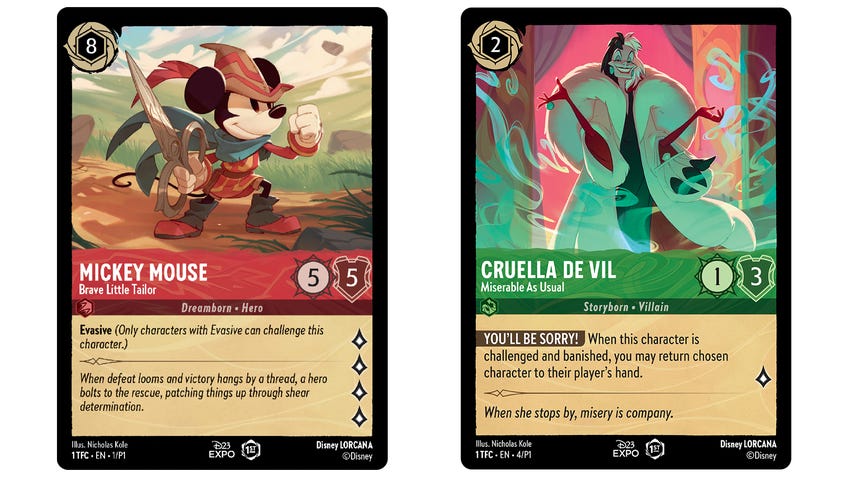
Another key difference - and one that feels decidedly Disney - is that players aren’t competing to grind their opponent into the floor by chopping away at life points with attacks. While characters can battle, the competition between the players is more of a race, as they use characters to generate ‘lore’ points by ‘questing’ instead of fighting. The first player to 20 wins - meaning you could technically go a whole game without fighting your opponent if you build a deck around churning lore as quickly as possible.
The individualisation of the victory condition also means that Lorcana scales neatly from the standard rules for two-player matches to a multiplayer format more akin to Magic: The Gathering’s popular Commander. Whereas Commander ups players’ deck sizes and health totals, Lorcana simply opens up the option for attacking different opponents without any other necessary changes. (Official support for more formats is apparently planned - I love the idea of a Commander-style deck led by Pluto or Goofy.)
The change in focus from fighting to racing became my first big realisation that Lorcana is far more than I cynically expected from a Disneyfied TCG.
Across a number of games at Gen Con, it was this change in focus from fighting to racing that became my first big realisation that Lorcana is far more than I cynically expected from a Disneyfied TCG. (Disclaimer: Ravensburger provided Dicebreaker with Lorcana starter decks and booster packs.)
Cards can only be challenged by an opponent’s card when exerted - turned sideways, like tapping in MTG - after fighting, questing or using a specific ability, meaning that they’re not at risk until you use them. (Some abilities can also target unexerted cards.) But not using them has less of a direct benefit - you don’t need to defend your life points, as in MTG or Yu-Gi-Oh!, so leaving cards upright is typically only worthwhile if they’re likely to be challenged by your opponent and you need them for a future turn. At the same time, you need lore to advance towards victory, so questing with a powerful card is often worth it for the points gain even if it opens it up to attack.
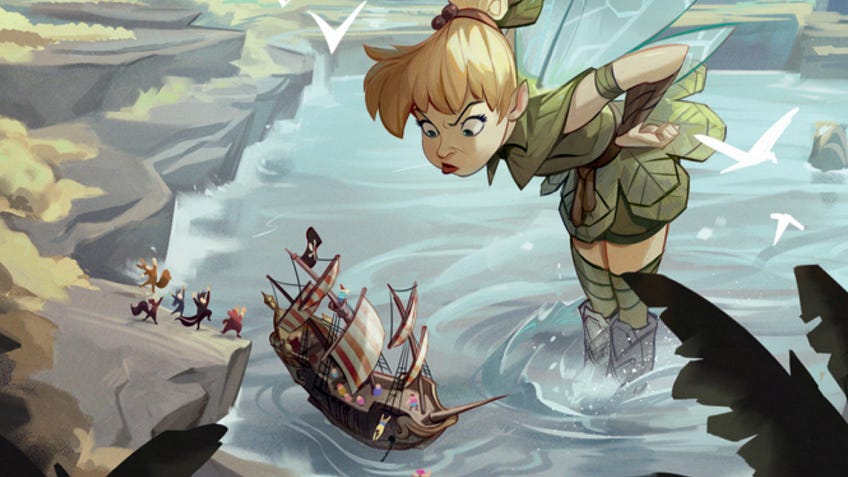
The toss-up between questing to accelerate your own victory and challenging your opponent’s cards to slow their progress makes for a notably different and fresher feel from the directly antagonistic likes of MTG, Pokémon and Yu-Gi-Oh! A closer comparison is the key-collecting race of often overlooked ‘unique deck game’ Keyforge, but with greater deck customisation and that irresistible Disney hook.
Adding to the less confrontational feel - for better and worse, depending on your preference - is Lorcana’s more cleanly separated player turns. Debut set The First Chapter has no cards that interrupt your opponent during their turn or shut down their actions, leading to a simpler division of each player’s actions that makes it less complex than other TCGs’ timing-based strategy. The downside is that this can feel at points a little too siloed - especially if both players are focused on churning lore or getting cards on the field for a few turns.
Those moments aren’t too frequent, though. My games swung nicely between building up cards before sending some at my opponent and using others to tick up my lore - or doubling down on one or the other as needed. There’s plenty of room for those dramatic swings and comebacks. In one close match, my opponent pulled ahead by almost 10 lore thanks to a robustly defended Moana (with the power to quest a whopping three lore points!), leaving them only a handful of points from victory. A few turns later, I managed to clean house on their side of the board with a combination of instant effects and character challenges, overtaking them for the win.
There’s as much reliance on the luck of the draw as any TCG - the starter decks I played with didn’t have too many abilities allowing players to draw extra cards, though there are definitely cards in The First Chapter with greater card draw effects - and it feels closely balanced to avoid players being steamrolled without good reason.
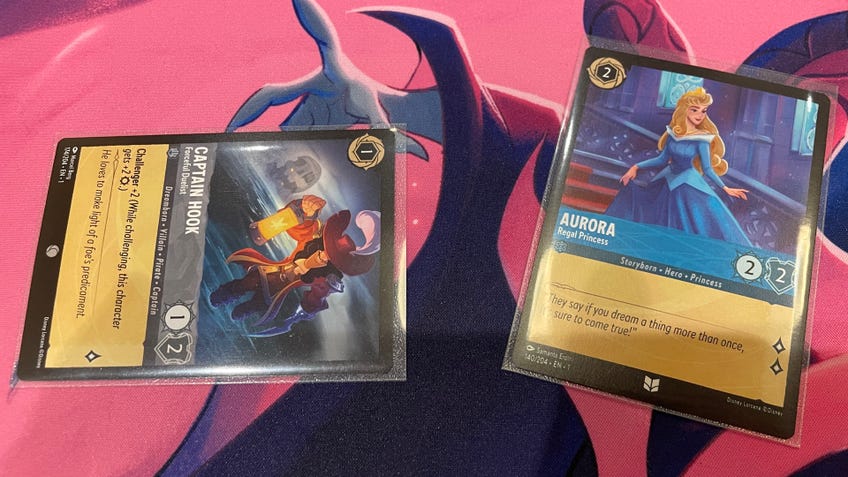
There’s a fine line between being deep enough to satisfy TCG players spoiled by decades of Magic: The Gathering mechanics, without throwing fans enchanted by Disney cards in at the deep end and watching them flounder. From my early impressions, Lorcana successfully lands in the middle, offering a gameplay experience with just enough depth in its first set to avoid the sense of a game that exists only as a tacked-on vehicle for collectors to buy cards.
Frankly, I came away from my time with Lorcana deeply impressed and with my cynicism that it would be another shallow TCG cash-in entirely dispelled. On the journey back from Indianapolis, I found myself constructing future decks across different pairs of differing ink colours using the game’s polished companion app, excited to dig through and see how different cards might combine into a ruthlessly efficient lore-gathering machine.
Lorcana has the greatest potential yet to mark a historic shift for trading card games and finally shake up that old guard.
The real test will come down to where Lorcana goes in the months and years to come. A second set is already planned for this November, with no details on what it will introduce to the game - beyond more cards. The hope is that the rock-solid foundation laid by The First Chapter deepens with each new release, guiding new players into a long-lasting game that continues to carefully tread the line between collectability and meaningful gameplay.
This first set proves that Lorcana’s creators clearly see it as more than a quick buck, and something that’s here to stay. If that vision comes true, Lorcana has the greatest potential yet to mark a historic shift for trading card games and finally shake up that old guard.
Disney Lorcana is planned for release in local game stores on August 18th, ahead of a wide release on September 1st. Disney Lorcana products are available on Zatu.
